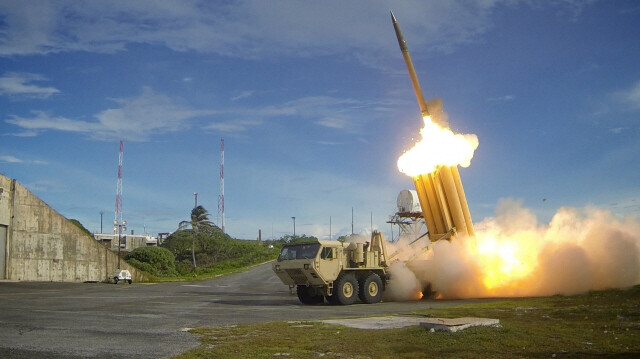hankyoreh
Links to other country sites 다른 나라 사이트 링크
[Analysis] South Korea, US continue pressuring China over North Korea sanctions

South Korea and the US continue ratcheting up pressure on China to impose stiffer sanctions on North Korea after its recent nuclear test.
Deliberations have focused in particular on whether a Terminal High Altitude Area Defense (THAAD) or missile defense system should be introduced on the Korean Peninsula - both highly sensitive issues for Beijing. Now the matters appear poised to cross the line and hurt Seoul’s and Washington’s ties with Beijing, potentially ushering in an additional threat to Northeast Asian political stability beyond the nuclear test.
White House Deputy National Security Advisor Ben Rhodes confirmed on Jan. 13 that discussions were under way with South Korea and Japan on beefing up missile defense capabilities. The remarks, which come on the heels of South Korean President Park Geun-hye’s recent comments about “considering a THAAD deployment,” are strategically significant in a number of ways.
First, they signal a primary focus on achieving stiffer multilateral sanctions for North Korea’s fourth nuclear test at the United Nations Security Council (UNSC) level by bringing China on board, rather than bilateral sanctions. The risk with bilateral sanctions imposed independently by the US is that they carry a risk from Washington’s standpoint if the objections from North Korea are too great.
Second, as an extension of this strategy, they also indicate a strategy of applying the kind of military pressures typically used with hostile countries in order to get China to agree to stiffer sanctions. In announcing the missile defense discussions, Rhodes said, “[T]he fact of the matter is, the current status quo [from China] is destabilizing [to the Korean Peninsula], where you have nuclear tests.” The message read as a warning threatening the use of force to show how China’s security situation could be destabilized if it doesn’t step up its sanctions against Pyongyang.
It remains unclear for now whether the missile defense mentioned by Rhodes includes THAAD.
While THAAD is one key means of interception in a missile defense system, the broader framework of US-led missile defense also encompasses more binding agreements to institutionalize trilateral intelligence sharing and the integration of the three countries’ missile defense interoperability systems.
But the possibility of Washington toying with the THAAD card - if only to pressure Beijing - remains alive. Victor Cha, senior adviser and Korea chair at the Center for Strategic and International Studies (CSIS) and a frequent bellwether for Washington’s position on Korea issues, suggested as much during a House of Representatives hearing on Jan. 14.
“Though South Korea has expressed reluctance in the past, it is necessary to have a discussion about better missile defense cooperation, including the emplacement of THAAD on the peninsula,” Cha said.
The remarks suggest possible ground-clearing efforts to encourage public support for THAAD deployment.
US Department of Defense spokesperson Peter Cook also hinted at the possibility during a regular press briefing on Jan. 7. While he acknowledged that there had been “no formal consultations” on deploying THAAD on the Korean Peninsula, Cook also said it was “part of a larger discussion that we’ll continue to have with South Koreans about [military] capabilities and about the alliance moving forward.”
Even without a THAAD deployment, China views the US-led trilateral discussions on missile defense as having the aim of keeping it in check or containing it militarily.
But the approach of applying pressure through military means could very well end up proving self-defeating for South Korea and the US. The more threatened China feels militarily, the greater North Korea’s strategic value becomes - and the more likely it is that China will lean toward embracing Pyongyang rather than siding with Seoul and Washington on implementing the heavier sanctions they want.
By Yi Yong-in, Washington correspondent, and Lee Je-hun, staff reporter
Please direct questions or comments to [english@hani.co.kr]

Editorial・opinion
![[Column] Season 2 of special prosecutor probe may be coming to Korea soon [Column] Season 2 of special prosecutor probe may be coming to Korea soon](https://flexible.img.hani.co.kr/flexible/normal/500/300/imgdb/original/2024/0426/3317141030699447.jpg) [Column] Season 2 of special prosecutor probe may be coming to Korea soon
[Column] Season 2 of special prosecutor probe may be coming to Korea soon![[Column] Park Geun-hye déjà vu in Yoon Suk-yeol [Column] Park Geun-hye déjà vu in Yoon Suk-yeol](https://flexible.img.hani.co.kr/flexible/normal/500/300/imgdb/original/2024/0424/651713945113788.jpg) [Column] Park Geun-hye déjà vu in Yoon Suk-yeol
[Column] Park Geun-hye déjà vu in Yoon Suk-yeol- [Editorial] New weight of N. Korea’s nuclear threats makes dialogue all the more urgent
- [Guest essay] The real reason Korea’s new right wants to dub Rhee a founding father
- [Column] ‘Choson’: Is it time we start referring to N. Korea in its own terms?
- [Editorial] Japan’s rewriting of history with Korea has gone too far
- [Column] The president’s questionable capacity for dialogue
- [Column] Are chaebol firms just pizza pies for families to divvy up as they please?
- [Column] Has Korea, too, crossed the Rubicon on China?
- [Correspondent’s column] In Japan’s alliance with US, echoes of its past alliances with UK
Most viewed articles
- 1‘We must say no’: Seoul defense chief on Korean, USFK involvement in hypothetical Taiwan crisis
- 2AI is catching up with humans at a ‘shocking’ rate
- 3The dream K-drama boyfriend stealing hearts and screens in Japan
- 4[Column] Can we finally put to bed the theory that Sewol ferry crashed into a submarine?
- 5S. Korea “monitoring developments” after report of secret Chinese police station in Seoul
- 6[Editorial] Yoon cries wolf of political attacks amid criticism over Tokyo summit
- 7Doubts remain over whether Yoon will get his money out of trip to Japan
- 8[Photo] “Comfort woman” survivor calls on president to fulfill promises
- 9[Editorial] Was justice served in acquittal of Samsung’s Lee Jae-yong?
- 101 in 5 unwed Korean women want child-free life, study shows